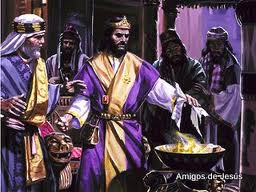
CAPTURE OF JERUSALEM
BY THE CHALDEANS.
IT was at midnight on the 9th day of July, 586 years before Christ, that the besieging army of the Chaldeans forced their way within the walls of Jerusalem.
For eighteen months they had beleaguered the Holy City, casting up gigantic mounds and forts overtopping the walls. They had swept away all the pleasant country homes and rural retreats in the neighborhood of the city.
A Babylonian chief had planted his throne in view of each of the city gates. All the horrors usually attendant upon a siege were suffered and by the population cooped within the walls. Famine was followed by pestilence.
The once beautiful countenances of the nobles became ghastly with starvation.
The richly clad ladies of Jerusalem sat down in despair upon dunghills, or sought from these foul heaps the morsels by which they eked out their supply of food.
Little children with parched tongues fainted in the streets with hunger, or even became food for their starving parents.
The one road, which still remained open toward Jericho was infested with wild Arab tribes, Edomites, who rejoiced to aid in rendering the downfall of the city and the nation complete.
Led by six princes of the king of Babylon, the Chaldean guards broke through the walls on the north, overpowered the night-watch, and, probably without occasioning any alarm, made their way to the middle gateway in front of the brazen altar of the temple.
Here, doubtless, they encountered those who had, fled to the temple as their last place of refuge, those who fondly hoped that the divine protection would make the holy house impregnable, and those whose office made it their duty to defend it with their lives.
Indignant that the heathen should set foot within the sacred precincts, they threw themselves with a last mighty effort upon the invaders, and perished in the vain attempt.
The noise of this conflict doubtless was borne to the ears of the king in his palace, whither the invaders had not yet come. Gathering together his family and his bodyguard, while yet the summer morning had not dawned, Zedekiah stealthily glided among dark and crooked streets to a passageway or opening between two walls at the southeastern corner of the city, which were not guarded as were the gates.
Down past the royal pleasure-gardens, sad reminders of joys now forever gone, the broken-hearted fugitives made their way. They descended the steep and rugged defiles through which the higher country breaks down into the deep chasm of the Jordan; they reached the plains of Jericho breathless and fatigued with their rapid flight over such a road.
Could they have crossed the Jordan, they would, like David in his flight from Absalom, have felt themselves safe.
But the Chaldean soldiers were upon their track. Jeremiah says they were swifter than the eagles of heaven.
Overtaken by their pursuers in the plains of Jericho, the worn out and dispirited guards forsook their king and scattered in every direction.
He and his family became an easy prey to the Chaldeans. In chains they were carried north-ward to Riblah, the headquarters of Nebuchadnezzar, the Chaldean king. The fate of Zedekiah exactly fulfilled two prophecies, which, like some other Scripture passages, appear to a careless reader quite contradictory.
Jeremiah carried a prophetic message from God to the king in these words: "Thine eyes shall behold the eyes of the king of Babylon, and he shall speak with thee mouth to mouth, and thou shalt go to Babylon."
Ezekiel, on the other hand, says: “I will bring him to Babylon, to the land
of the Chaldeans; yet shall he not see it, though he shall die there."
At Riblah, Zedekiah beheld Nebuchadnezzar, the Babylonish king. He also was compelled to witness the slaughter of his sons and his courtiers who had attended him in his flight; and then, before be was carried to Babylon, his own eyes were put out.
He spent his life there, and worked, like a slave, in a mill, but Babylon he never saw. With the fall of Zedekiah ended forever the Jewish monarchy. Since the anointing of Saul it had lasted five hundred years. With the monarchy fell also the State.
The history of the Jews as an independent nation was virtually finished. It had lasted from the crossing of the Red Sea, 1491 years before Christ, just nine centuries. Many, indeed, fierce, were the struggles by which the Jews endeavored to regain their national existence, but brief successes were gained only to be followed by more complete overthrow.
They fell and perished as a nation; their monarchy was overthrown; their land became the possession of strangers; they were exiled and scattered over the known world, as a final and deserved retribution for obstinate rebellion, idolatry, and unfaithfulness.
They became the most marked example among all nations of the fact that God governs the world, and that he will deal with nations according to their deserts.
Having given express laws to the Jews, and having accompanied them with distinct promises and threatenings, it was needful that he should keep his word before all the world in their overthrow.
From Exile to Overthrow.